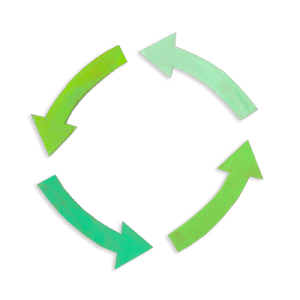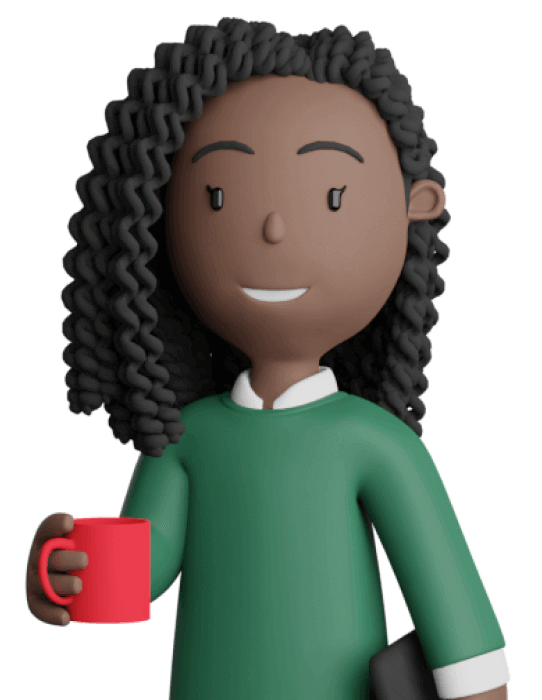Dig deep into green jobs
Students are encouraged to research unfamiliar careers and present their findings in an infographic.

Overview
This activity starts with students playing a group card game to select three careers for deeper investigation. Then they explore these three careers researching information like wages, education requirements and job prospects. Finally, students choose one career and create an infographic to share with their peers.
Instructions
What you'll need
- “Career choice cards”, print one set (double sided) per group of 4-5 students
- Scissors, 2 pairs per group of 4-5 students
- “Explore and create an infographic” student handout, print one copy per student
- Student individual access to computer or tablet
Career choice cards
Explore
Infographic
|
Modify or extend this activity
- Pull up the “What do you do at work” activity to continue this unit “Careers in the green economy: sustainable career paths”.
- In pairs, role play a career information session with one student who researched a specific career providing answers verbally to the other student asking questions.
Curriculum Fit
Career Education 8 & 9
Big ideas
- Reflecting on our preferences and skills helps us identify the steps we need to take to achieve our career goals.
- Our career paths reflect the personal, community, and educational choices we make.
Content
- Personal development: self-assessment for career research.
- Community connections: local and global needs and opportunities, and factors affecting types of jobs in the community.
Competencies
- Use self-assessment and reflection to develop awareness of their strengths, preferences, and skills.
- Question self and others about how individual purposes and passions can support the needs of the local and global community when considering career choices.
- Recognize and explore diverse perspectives on how work contributes to our community and society.
Career-Life Education (CLE) (10-12)
Big ideas
- Career-life choices are made in a recurring cycle of planning, reflecting, adapting, and deciding.
- Career-life decisions are influenced by internal and external factors, including local and global trends.
Content
- Career-life development: self-assessment and reflection strategies.
- Connections with community: factors that both inform career-life choices and are influenced by them, including personal, environmental, and land use factors and ways to contribute to community and society that take cultural influences into consideration.
Competencies
- Experience: Identify career-life challenges and opportunities and generate and apply strategies.
- Initiate: Explore and reflect on career-life roles, personal growth, and initial planning for preferred career-life pathways.
Career-Life Connections (CLC) (10-12)
Big ideas
- Career-life development includes ongoing cycles of exploring, planning, reflecting, adapting, and deciding.
- Career-life decisions influence and are influenced by internal and external factors, including local and global trends.
Content
- Personal career-life development: factors that shape personal identity and inform career-life choices and reflection strategies.
- Connections with community: career-life exploration.
- Career-life planning: self-assessment to achieve goals that advance preferred career-life futures and labor market trends, and local and global influences on career-life choices.
- Career-life choices are made in a recurring cycle of planning, reflecting, adapting, and deciding.
Competencies
- Examine: Analyze internal and external factors to inform personal career-life choices for post-graduation planning.
- Experience: Engage in, reflect on, and evaluate career-life exploration.
Assessments
- Assess students’ engagement in selecting their three careers to research further.
- Assess students’ ability to research the careers and distill the pertinent information.
- Assess students’ skill to produce a creative and effective infographic.
Teaching Notes
Government of Canada Job Bank
This site is a comprehensive resource on career planning, market information, and job searches. Students can take the “explore career possibilities” quizzes and/or the “explore your personality quizzes” to guide the process of exploring careers. Many of the jobs suggested after taking the quizzes are green jobs.
What is a career in sustainability, and why might you be interested?
Sustainability is less a sector and more a highly diverse area that cuts across many industries – broadly, a ‘job in sustainability’ means performing a role that combines environmental, social, and economic factors, and has a strong focus on environmental or social justice issues.
You might be interested in working in sustainability because of:
- a value you hold (for example, an accountant may really care about the social and environmental regeneration of their local area and choose to work for an organization promoting this),
- a knowledge base you have (for example, you might hold a degree in a sustainability-related subject or have previous relevant work experience),
- the career opportunities this growing sector presents, or
- a combination of the above.
Excerpt from source.
Check out the following BC Hydro websites for career information
Career Connections
On this tab, you’ll find information about careers that students may be inspired to explore after completing this activity. These profiles highlight real roles and in related fields, helping students see how the skills, knowledge, and interests they are developing can translate into meaningful career pathways. Use this section to spark curiosity, encourage future planning, and show students the many ways they can contribute to a cleaner, more sustainable future.
Below are some potential career paths connected to this activity:
1. Environmental Scientist
Studies ecosystems, wildlife, water, and land to help protect the environment and guide sustainable decisions.
2. Renewable Energy Engineer
Designs and improves clean-energy systems like hydro, wind, and solar power.
3. Energy Conservation Advisor
Helps communities and businesses reduce their electricity use and become more energy-efficient.
4. Indigenous Relations Advisor
Works with Indigenous communities on sustainable projects and ensures environmental and cultural values are respected.
5. Hydrologist
Studies rainfall, snowpack, and water flow to help plan hydroelectric generation and protect ecosystems.
6. Environmental Project Coordinator
Supports clean-energy projects by organizing studies, permits, fieldwork, and environmental monitoring.
7. Sustainability Consultant
Advises organizations on how to lower emissions, reduce waste, and make environmentally responsible choices.







